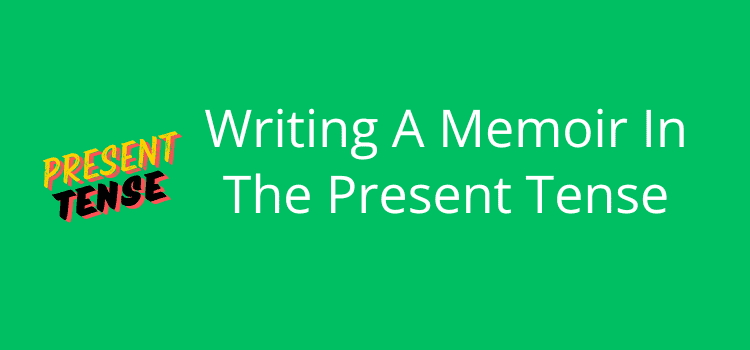
It’s quite unusual to find a memoir written in the present tense. When we think of a memoir, we know it’s a story about the past and should, therefore, be written in the past tense.
However, that’s not always the case because there is no hard and fast rule that says authors can’t choose between present and past tense for any story.
I’m sure that many authors and writers have a tendency to instinctively use past tense in most forms of fiction. But for non-fiction, like self-help and advice, the present tense is often the most logical choice.
But memoirs in the present? Is it possible?
Turning I was into I am
Memoirs almost always use the first-person point of view, which is natural.
But changing the tense from past to present is not typical at all.
If you have never considered this, it’s an option that can open the way to a more engaging story because it lets your readers experience events as they happen.
Past tense creates a distance between a reader and a story. But the present tense can bring things much closer or more vividly to a reader’s mind.
In simple terms, all you need to do is change from the mindset of I was to I am.
I was very anxious about attending my first day in high school in 1967.
It’s 1967, and I’m anxious about attending my first day in high school.
When you start with a simple present sentence like this, you will naturally follow on with what you feel, think, and say instead of what you felt, thought, or said.
The major benefit is the immediacy. The story is happening now, even though it’s about a past event in your life.
However, it’s not the easiest writing style because it comes with challenges, even for an experienced writer.
Writing in the present
Choosing to write a memoir in the present tense doesn’t mean you won’t use past tenses in your story.
But deciding when to use the past is not always easy.
If you are writing about an event in your life that happened a few years ago, the present can work quite well.
But if you want to flashback from that point in your story to your childhood, the only way to do it is with past tenses.
Trying to stay in the present would be jarring and unnatural.
There is also the challenge of weaving your current perspectives with the experiences you cover in your story.
However, using the present consistently is the key to writing a memoir in this style.
But this requires a bit of imagination and good writing skills to pick and choose when and how to use other tenses.
Okay, so it’s not easy, but there are benefits.
The main upsides to writing in the present are immediacy and emotional connection.
Using the present tense creates a sense of now, placing the reader directly in the moment with you.
Another benefit is that you will likely use more active voice than passive voice, which is more dynamic.
These elements can strengthen the emotional impact of your experiences.
The choice of tense is up to you. I certainly wouldn’t suggest that present is better than using past tense. It’s only that it’s a possibility you may not have considered.
Examples of present tense memoirs
The best way to grasp this writing style is by reading memoirs that use the present tense.
But to give you some clues, here are short extracts from two well-known memoirs.
An extract from The Accidental Buddhist by Dinty W. Moore
ZEN MOUNTAIN MONASTERY is an impressive stone structure tucked neatly onto the side of Tremper Mountain, in the Catskills, in eastern New York State.
I arrive there with a fair degree of trepidation on a Friday evening and am directed to a second-floor dorm room. There are eight bunk beds and a sink crammed into the small area. When I stumble in, Harold, a sixty-something attorney with a neatly trimmed white beard, has already marked out his territory by spreading his expensive luggage in a wide circle.
He introduces himself amicably enough, but only as an excuse, it seems, to make it clear to me within seconds that he knows more about Zen, Buddhism, and meditation than anyone, other than perhaps the Buddha himself. He mentions the many zendos where he has studied, the Zen koans (riddles, more or less) he has contemplated, the teachers he has spoken with, and throws around an impressive array of foreign-sounding words.
I am stuck listening to the boasting because Harold has blocked my way to where I hope to make my bunk, and because Wayne, the only other roommate to have arrived at this point, has wisely retreated to his bed, where he quietly reads a book.
An extract from Forces of Nature by Gina DeMillo Wagner
I rest my head against the seat in front of me and do my best to breathe in through my nose and out through my mouth. I tell myself the texts might mean nothing. I try to imagine other reasons my father needs to reach me so urgently, but I can’t. I clutch my thighs to stop them from trembling. I wait, breathing in and out until people clear the aisle. When they do, I grab my bag and run for the door.
The terminal isn’t better. Swarms of travelers consume every available space with backpacks and roller bags. I look for a pocket of quiet, any open place to sit down and return my dad’s call out of earshot, but there isn’t a vacant seat anywhere.
And so, I stand there in the middle of the concourse, people rushing around me. I focus my gaze on a vertical window on a far wall, where sunlight is coming in, creating stripes on the stone floor. I stare at the light, and I dial my father, and I listen to him tell me what I already know: My brother is dead.
My mind somersaults. For as much as I imagined this happening – since I was five, I’ve imagined my brother dying – I am shocked and unprepared. “How? I don’t understand,” I whisper into the phone.
Both of these examples highlight how using the present tense in a memoir can be very effective in relating to events in the past.
Summary
Yes, memoirs are usually written in the past tense. The same goes for most fiction.
But that doesn’t mean it’s the only way to tell your story.
Using the present tense for a memoir can bring an extra layer of reality and presence.
It’s also a great style for detective stories, which in some ways are similar to memoirs.
However, it’s not the easiest style to master. It takes quite a bit of practice to start feeling comfortable with it.
If this is a new idea and approach for you, why not give it a try? Experiment with what you can do when writing a story in the present tense.
Related Reading: Memoir Or Autobiography? How To Choose The Right Genre




Thanks, Derek, for featuring my book.
My pleasure!